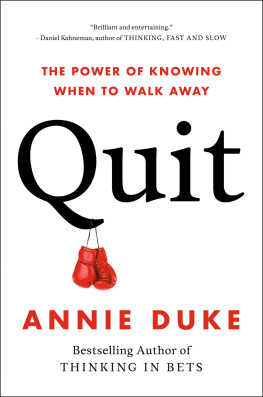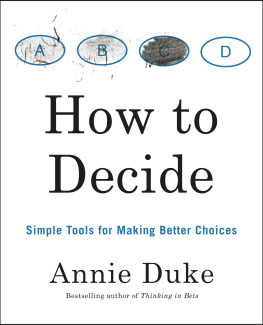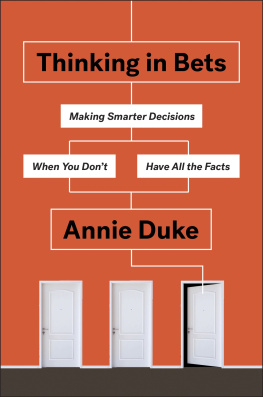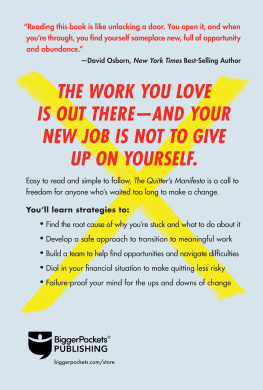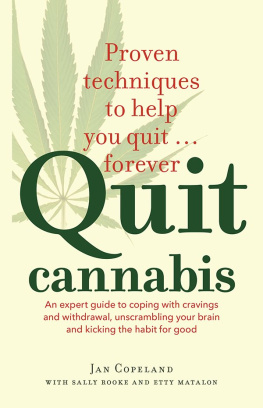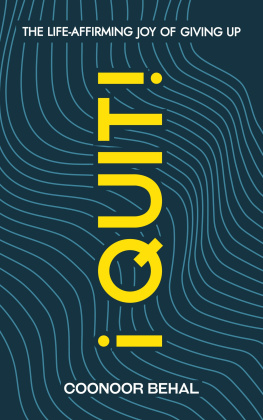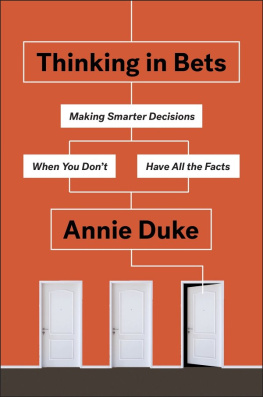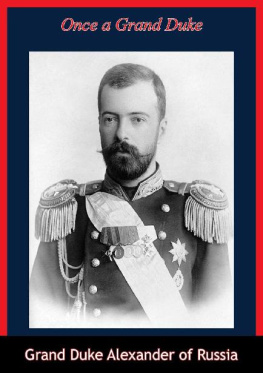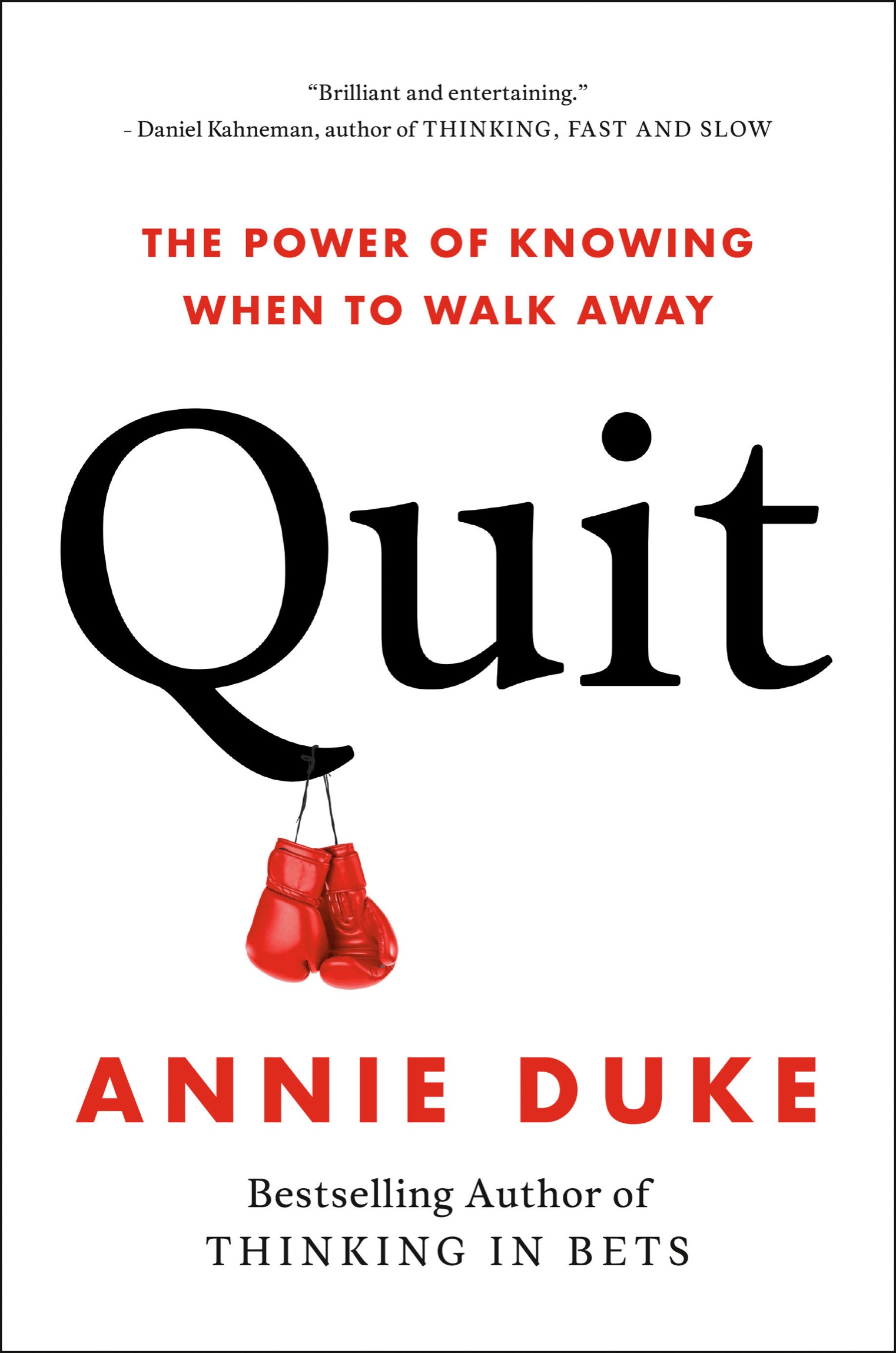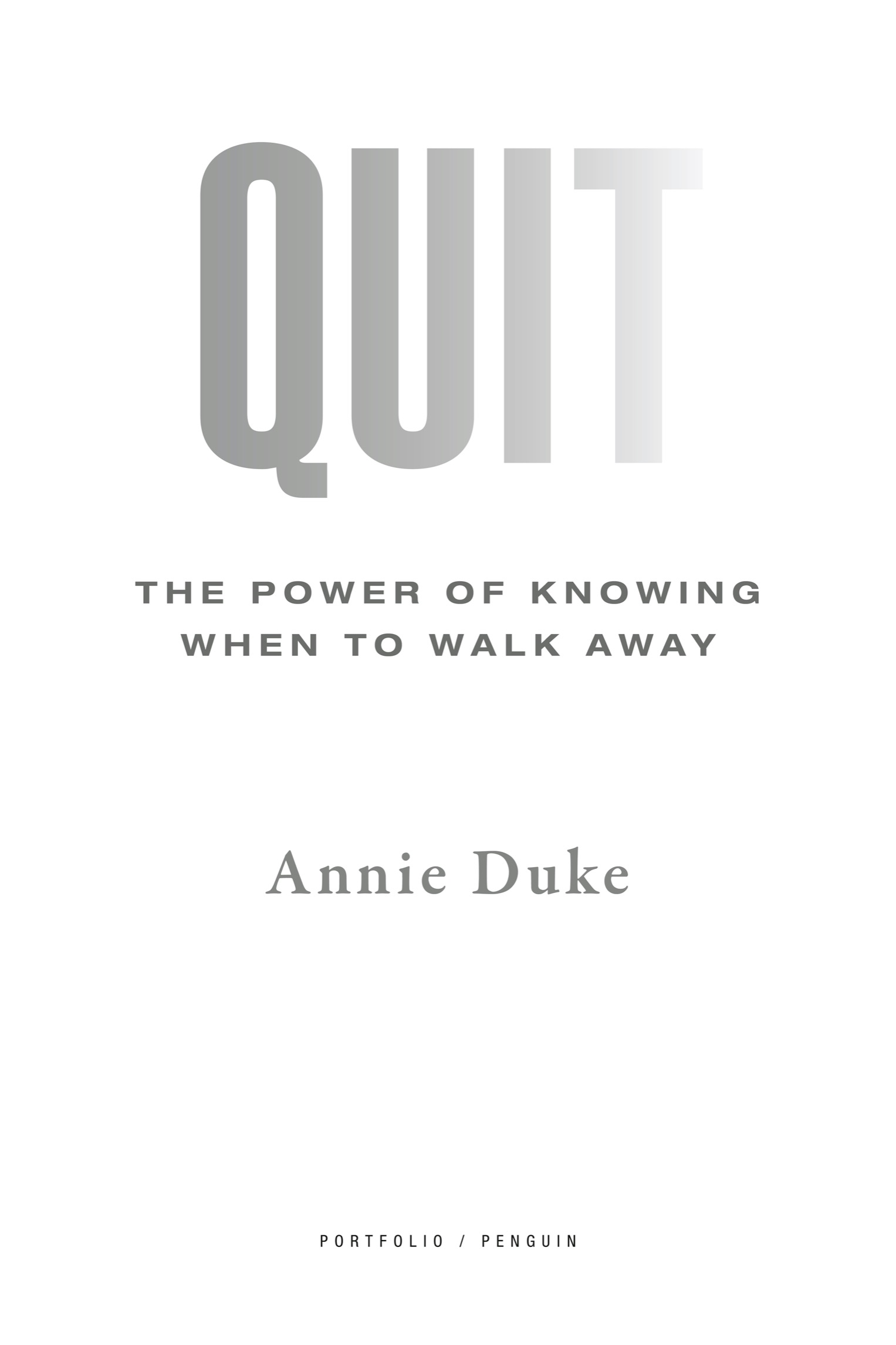Praise for Quit
This brilliant and entertaining book documents a major flaw in human actions and decisions: the bias against quitting. I learned a lot from its compelling tales of failures and sound recommendations. You will too.
Daniel Kahneman, Nobel Prize winner in economics and #1 New York Times bestselling author of Thinking, Fast and Slow
Every business school has a course in starting new businesses, but few have a course in shutting them down at the right time. This book fills that gap with brilliant new insights and fantastic stories. Quit what you are doing right now and start reading this book.
Richard Thaler, Nobel Prize winner in economics and bestselling coauthor of Nudge
Engrossing, important, and grounded in science, Quit is a gem that will allow you to navigate the world more effectively.
Katy Milkman, bestselling author of How to Change
Quit is the rare book that is both a page-turner and a legitimately important contribution. If youve never thought of quitting as a competitive advantage before, prepare to be enlightened.
David Epstein, bestselling author of Range
There arent many times you will say, this book changed my life. This is one of them.
Seth Godin, bestselling author of The Practice
Only a poker player could write this classic book on whenand more importantly howto fold a bad hand in business, investing, relationships and life.
Ryan Holiday, #1 New York Times bestselling author of Stillness Is the Key
Theres no wisdom that matters more in life than knowing when to persist and when to pull the plug. Annie Duke offers a wealth of knowledge to help you figure out whether its time to let go.
Adam Grant, #1 New York Times bestselling author of Think Again and host of the TED podcast WorkLife
A game-changing book of strategy from a world-class thinker on risk and decision-making.
Shane Parrish, host of The Knowledge Project podcast
The opposite of a great virtue is also a virtue. And Quit is the perfect dialectical complement to Grit. Weave these two virtues into your character and live a much more fulfilling life.
Philip Tetlock, bestselling author of Superforecasting
Quitting is not just an art; its also a scienceand there is no one so uniquely suited to teach us both as Annie Duke.
Brian Christian, coauthor of Algorithms to Live By
Not since Kenny Rogers has an expert storyteller so clearly demonstrated the importance of knowing when to hold em and when to fold em, nor presented a clearer strategy to determine when, instead of merely walking away, its time to run.
David McRaney, author of How Minds Change
You wont want to quit reading this book, both because it is such a rewarding read and also because its lessons are so important, useful, and memorable.
Don A. Moore, author of Perfectly Confident
OTHER WORKS
Thinking in Bets
How to Decide

Portfolio / Penguin
An imprint of Penguin Random House LLC
penguinrandomhouse.com

Copyright 2022 by Annie Duke
Penguin Random House supports copyright. Copyright fuels creativity, encourages diverse voices, promotes free speech, and creates a vibrant culture. Thank you for buying an authorized edition of this book and for complying with copyright laws by not reproducing, scanning, or distributing any part of it in any form without permission. You are supporting writers and allowing Penguin Random House to continue to publish books for every reader.
Grateful acknowledgment is made for permission to reprint The Gambler. Words and music by Don Schlitz. Copyright 1977 Sony Music Publishing (US) LLC. Copyright renewed. All rights administered by Sony Music Publishing (US) LLC, 424 Church Street, Suite 1200, Nashville, TN 37219. International copyright secured. All rights reserved. Reprinted by permission of Hal Leonard LLC.
Library of Congress Cataloging-in-Publication Data
Names: Duke, Annie, 1965- author.
Title: Quit: the power of knowing when to walk away / Annie Duke.
Description: New York: Portfolio/Penguin, [2022] | Includes bibliographical references and index.
Identifiers: LCCN 2022018987 (print) | LCCN 2022018988 (ebook) | ISBN 9780593422991 (hardcover) | ISBN 9780593423004 (ebook)
Subjects: LCSH: Failure (Psychology) | Choice (Psychology) | Persistence. | Success.
Classification: LCC BF575.F14 D85 2022 (print) | LCC BF575.F14 (ebook) | DDC 158.1dc23/eng/20220729
LC record available at https://lccn.loc.gov/2022018987
LC ebook record available at https://lccn.loc.gov/2022018988
ISBN 9780593544020 (international edition)
Book design by Tanya Maiboroda, adapted for ebook by Cora Wigen
pid_prh_6.0_141032872_c0_r0
To my children, my
CONTENTS
PROLOGUE
The Gaffed Scale
In October 1974, boxer Muhammad Ali pulled off one of the greatest upsets in the history of sports when he knocked out George Foreman in the famous Rumble in the Jungle. With that victory, Ali regained the heavyweight boxing championship, a title he had first earned when he dethroned Sonny Liston a decade earlier in 1964.
Ali faced unbelievable odds and adversity on the way to this momentous triumph. In 1967, he was stripped of his heavyweight title after refusing to serve in the Vietnam War, depriving him of the opportunity to fight for three and a half years during what should have been the prime of his career. After that layoff, he had to fight his way back into contention for another four years to get the title shot against George Foreman. By this time, Ali was nearly thirty-three and had fought as a professional forty-six times.
Foreman was heavily favored: younger, bigger, stronger, undefeated, and considered indestructible. Ali had split a pair of fights that went the distance against both Joe Frazier and Ken Norton. Neither Frazier nor Norton lasted two rounds against Foreman.
When Ali bested Foreman, he cemented his status as the Greatest of All Time.
Muhammad Ali became a symbol of grit. Against all odds, among a sea of naysayers, he had refused to give up and triumphed. Is there any greater testament to the power of persistence and perseverance when it comes to pursuing your dreams?
But the story doesnt end there.
That same grittiness led Ali to fight for seven more years. From 1975 to December 1981, Ali persisted despite repeated, unambiguous signals that he should quit. In 1977, after friends and reporters noticed signs of his physical and mental deterioration, Teddy Brenner, the matchmaker at Madison Square Garden (which had hosted eight Ali fights) begged him to retire.
Ali waffled.
Brenner followed with the announcement that Madison Square Garden would never host another of his fights. I dont want him to come over to me some day and say, Whats your name? The trick in boxing is to get out at the right time, and the fifteenth round last night [against Earnie Shavers] was the right time for Ali.

